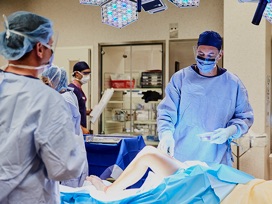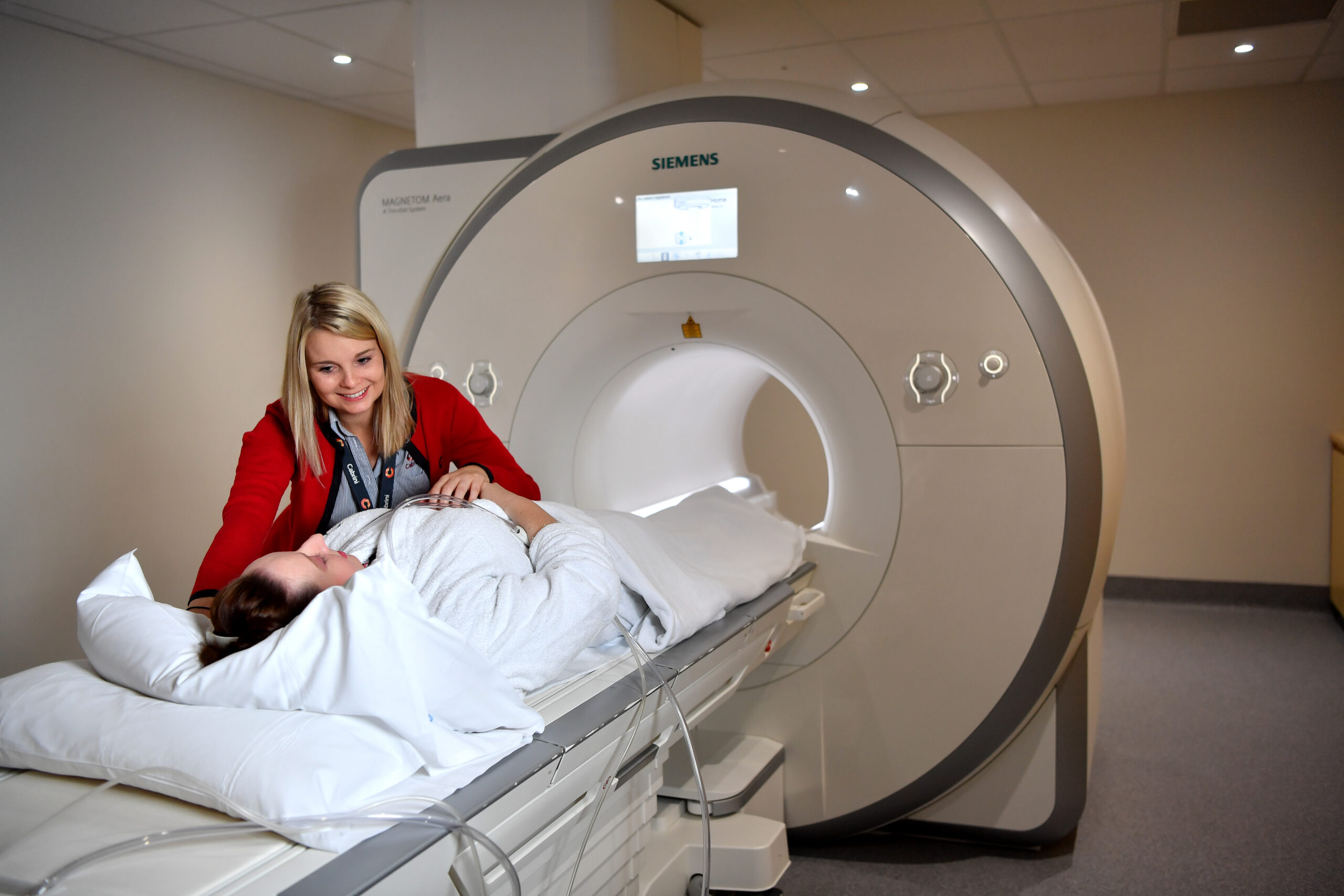Surgical services
Our experienced and highly skilled surgeons carry out a comprehensive range of elective and emergency operations for both adults and children at our two acute hospitals. Using the latest technology and state-of-the-art facilities our team of specialists lead the way in improving patient outcomes.
About our surgical services
When you have surgery at Cabrini, you can trust that we will make your treatment and care our highest priority.
Our surgeons have extensive experience with traditional and minimally invasive surgical procedures and they are constantly pushing the boundaries of what is possible, ensuring patients receive the best outcome.
Cabrini surgeons work in partnership with highly skilled specialists in our anaesthetic department, surgical wards and Intensive Care Unit which cares for more than 1600 patients a year.
We have the latest technology available to enhance our experts’ technical expertise. Our state-of-the-art operating theatres, wards, labs and other hospital services include: robotic surgeons, a hybrid theatre for endovascular surgery and a cardiac catheter laboratory.
Patients who need urgent medical help can gain rapid access to our leading surgical services via our Emergency Department at Cabrini Malvern, which is open 24 hours, seven days a week.
To find a specialist, please visit our Find a Doctor page.
-
General enquiries
-
Operating hours
24 hours, 7 days a week
-
Referrals
You will need a referral from your GP to be seen by a Cabrini specialist and receive any relevant Medicare rebate.
To find a specialist, please visit our Find a Doctor directory.
Alternatively, if the matter is urgent, the Cabrini Malvern Emergency Department (ED) can help you 24 hours, 7 days a week. The ED team can refer you to the most appropriate specialists to cater for your individual needs.
To choose the right specialist from either Cabrini Malvern or Cabrini Brighton, please visit the Find a Doctor directory to see our comprehensive list of experts. You can also find more information about our surgical services and medical facilities on our Find a Service pages.
Our doctors, surgeons and healthcare professionals are always available to help. Please call them directly if you would like advice, or to discuss a treatment plan in advance.
If your patient is unwell the specialist of your choice can admit them for inpatient observation and treatment.
Alternatively, if the matter is urgent, the Cabrini Malvern Emergency Department (ED) is open 24 hours, 7 days a week. The ED team can provide a referral to the most appropriate specialist to meet your patient’s needs.
-
Surgical procedures
- Bariatric
- Breast
- Cardiothoracic (heart and lung)
- Colorectal (bowel)
- Endocrine
- ENT (ear, nose and throat)
- Gastroenterology
- Gynaecology / Urogynaecology
- Neurosurgery
- Ophthalmology (eye)
- Oral and Maxillofacial
- Orthopaedic
- Paediatric
- Plastic and Reconstructive
- Pancreatic
- Upper GI (gallbladder, liver, oesophagus, pancreas and stomach)
- Urology
- Vascular
Why choose Cabrini for your surgery?
At Cabrini we believe in empowering our patients, their families and their healthcare team with choice.
We offer:
- The chance to choose a specialist based on patient’s individual needs and preferences
- The ability to avoid waitlists in the public hospital system
- Access to the latest technology and treatments and a team of specialists with extensive experience
Regardless of whom you choose to lead your care at Cabrini, patients and GPs can take comfort from knowing our specialists put their patient’s needs and wishes first. They are here to listen to patients, advise their medical team and use their expertise to guide them back to good health.

Your surgical stay at Cabrini
Overview
The purpose of surgery is to improve the health of patients. This may be completed as:
- Day Surgery – where you are admitted, have surgery, and are discharged on the same day
- Multi-Day Admission – where you stay for a few days following your surgery for monitoring and recovery before being discharged home or transferred to rehabilitation.
Preadmission phone call
The preadmission phone call provides an opportunity for the hospital to collect information necessary to achieve a positive outcome for patients. We gather information about your previous surgeries, your health history, and any medications you currently take.
Admission
The hospital admission is a time to confirm all the information gathered via the preadmission phone call, collect any additional information, and answer any questions you may have.
Diagnostic studies may be conducted prior to your surgery. These will be ordered by your doctor, surgeon, or anaesthetist, to assist them in treating you while you are under anaesthetic. These tests may include blood tests, cardiac monitoring, X-Rays, CT scans or MRI.
Surgical services
The surgical experience involves moving through three different areas:
- Pre-operative (before surgery)
- Operative (during surgery)
- Post-operative (after surgery)
Each of these areas fulfills specific actions to achieve the final objective, the provision of safe and high-quality person-centred care.
Pre-operative (before surgery)
The pre-operative stage prepares the patient for surgery. You will move through a couple of different areas including Day of Surgery and Holding Bay, each with their own purpose. If on the day of admission, you are accompanied by family or friends, you will part company when you enter the holding bay. Your wait in the holding bay may be for 30 mins – 2 hrs and a nurse will be looking after you during this time.
The pre-operative surgical team are specialists in their field. Their aim is to identify and reduce the risks patients may encounter when they are in surgery and in their post-operative and recovery phase. This team includes nurses from Pre-Admission, Day of Surgery and Anaesthetics, as well as anaesthetists and surgeons.
Before going into surgery, you may wish to inform or ask the pre-operative team of the following:
- Ensure you have disclosed all medication you are currently taking including creams, balms, and herbal medicines
- Inform your anaesthetist about any unwanted side affects you encountered including nausea, vomiting and uncontrolled pain from any previous surgical procedures. This will help your anaesthetist to plan and prevent these from occurring.
- Ask your anaesthetist about post operative pain relief
Operative (during surgery)
The second stage is the operative period. This is divided into 3 sub-areas – the anaesthetic induction, the surgical phase and anaesthetic recovery.
The anaesthetic induction is done by the anaesthetist with the assistance of the anaesthetic nurse. This usually takes place in the anaesthetic bay just outside of the theatre. The anaesthetist will insert an intravenous (I.V.) line to give you medication in preparation for intubation which usually occurs inside the operating theatre. Most patients do not remember past this point as a result of the anaesthetic medication.
Surgery phase is the surgical procedure itself, which is conducted in the operating theatre and aims to solve the health problem afflicting the patient.
Anaesthetic recovery occurs after surgery. The anaesthetist will extubate patients in the operating theatre. Patients are usually very sleepy after an anaesthetic and are cared for by specialist nurses in the recovery area. Recovery nurses can provide strong pain relief to ensure your pain is under control. The surgeon and anaesthetist usually visit the patient in Recovery, however, patients rarely remember this visit due to the effect of the anaesthesia.
Post-operative (after surgery)
This is the third stage of the surgical process where you will be transferred out of Recovery to the ward for observation, monitoring, and ongoing care. Patients are provided with pain relief, antibiotics, and introduced to food and drink safely. You may need to continue to fast for a further 4 hours after your surgery to allow the bowel to recover from the anaesthetic. This helps prevent nausea and vomiting caused by eating and drinking before the gut is ready.
Discharge
Discharge is the final hospital stage and aims to ensure patients have all the information and support necessary to care for themselves at home. This includes providing clear follow-up instructions with your surgeon, information to manage your pain, instructions about medications for home and who to contact if you observe a sign or symptom of post-operative complications.
You can refer to the Preparing to go home checklist patient resource tool that was co-designed with consumers to support patients being involved in planning their discharge. This checklist of prompting questions supports patients to gain the information they need to feel confident and informed in time for their discharge.

We believe that our care should extend beyond the hospital into the community, so we are committed to supporting our patients’ recovery, whether that is monitoring them in the home, providing rehabilitation or transitional care.
By choosing Cabrini for your care, you can be confident that you will be cared for by an organisation with integrity. Everything we do is guided by our values: compassion, integrity, courage and respect.
We strive to provide the highest quality of care to the local community, rural and international patients.
